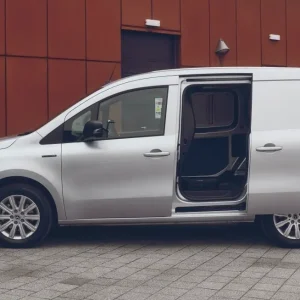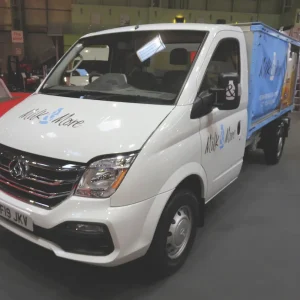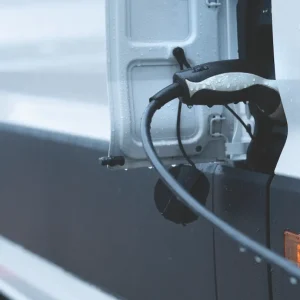There is more to running a fleet of commercial vehicles than simply going to your nearest dealership, buying the vans, putting the load in the back and the driver in the front and getting on with it.
It’s important for businesses to get the right vans for their needs and to carefully manage issues such as fuel costs, maintenance, accident management, disposal and the increasingly crucial area of health and safety.
Fleet management specialists can take care of all this to enable fleet operators to get on with running their core businesses, something that’s proving increasingly popular as firms look to oursouce non-essential operations. Dave Freeman, who heads up the commercial vehicle operation for leasing and fleet management company Alphabet, says the firm deals with everything from car-derived vans to five-tonne trucks. It also supplies vans in every format, from panel vans, to chassis cabs to wheelchair-adapted vehicles to minibuses.
“We cover every nook and cranny of LCVs,” Freeman says, and adds the firm manages fleets numbering from 15 to 20 vans up to those with “several thousand” vehicles, such as major utility companies. It currently has 15,000 commercial vehicles on its fleet.
A reasonable number of these are specced out for specific purposes, rather than being plain white boxes, with work carried out by specialist converters.
Meticulous care must be taken by the converter because, as Freeman points out, “we’ve always got health and safety looking over our shoulder”. It is essential the vans are equipped to hold their loads securely to ensure both goods and people are protected, and the systems are crash-tested before being used.
Freeman acknowledges that conversions are a big investment that generally do not offer a return at disposal time so, if possible, the kit needs to be removed before the van goes to auction so it can be re-fitted to a replacement. With a fleet of 100 vans, for example, Alphabet will build 10 new conversion kits and fit these to the first 10 new replacement vans. It will then fit removed and repaired kits to the rest of the fleet in batches of 10. “We have a surplus and it frees up the vans,” he explains.
Good fleet management involves taking into consideration the entire whole-life cost of a vehicle, accounting for elements including maintenance and fuel consumption and looking at information from the AA and RAC about reliability.
Accident management is another element that can be outsourced. But it’s not just at procurement time or when things go wrong that good fleet management can save time and money. Downtime management, when vehicles are off the road for maintenance or repair, is a vital component, as workhorses don’t make money when they’re not working. Where possible, Freeman said, services should be carried out overnight or at least out of working hours. In particular, Freeman says this is easier when dealing with networks such as Mercedes and Iveco, which open 24 hours to cater for their truck customers and thus offer the same service to van fleets.
Alphabet also makes use of mobile servicing at clients’ premises but says this stops short of covering warranty work, which requires the use of OEM parts.
Tyre replacement can be carried out at the clients’ premises having been pre-booked following an assessment of likely wear and tear sustained through their use and mileage. Freeman recommends working in conjunction with firms that can organise on-site inspections of a fleet’s tyres, picking up on wear-and-tear issues to both ensure employer’s duty of care requirements are met and that replacement tyres can be fitted promptly without the vehicle spending too long off-road at an inconvenient moment.
In Alphabet’s case, disposal of ex-fleet vans is through BCA’s specialist van sales. It manages returns carefully so as not to push down values by driving too much volume through at once and spreads batches of similar models around several auctions.
Along with conversion kits, livery is removed before sale and Freeman says blue-light vehicles must be closely monitored once their stints with the emergency services are finished. “The lights must be destroyed” he says.
“They must be taken to a specialist for removal.”
Another advantage of working with a fleet management firm from outside an individual operation is a fresh pair of eyes to look at a fleet and question decisions. Freeman cites choosing the most suitable vehicles as one example, which can mean advising them to downsize. “We ask, do you need the biggest van? We challenge what they have. We can help them.” Builders, for instance, may be able to get suppliers to deliver on site, and might not necessarily need the highest payload vans to carry materials themselves.
Other considerations include mileage, the type of journeys vans will make, whether they use routes with low bridges or need access to car parks. Freeman says it’s important to facilitate access to the load area through rear or side doors – it’s not good for operators’ employees to have to step into cargo bays as this increases the risk of injuries such as back strain, once more raising the spectre of breaching health and safety requirements. Likewise, roof racks are best avoided – it’s better to get everything inside the van. Apart from safety issues, they are wind-resistant and increase fuel consumption.
The software parade
Chevin’s web-based Fleetwave system provides van operators with an automated means of continuously monitoring operational performance through a centralised portal that collates data, ranging from procurement and maintenance schedules to driver health and licence checks and vehicle disposal.
Chevin’s boss Ashley Sowerby says: “The whole point of fleet management software is to make life easier for commercial vehicle operators, especially when it comes to helping them identify areas of waste and poor performance.
“Chevin’s software is built around the business it is used by and can accommodate any type of KPI, providing the relevant data is inputted.”
Fleetwave utilises a traffic light system on its homepage to flag up due, near-due and overdue tasks.
Sowerby says: “Health and safety compliance is a big issue that is continuing to grow and add additional pressure to fleets. Through the enhanced visibility
and process automation that capable fleet management software provides, ensuring vehicles are inspected and are roadworthy is easily achieved.”
With data relating to all vans stored within the system, Sowerby claims keeping track of maintenance schedules and VED requirements is simple and almost administration-free.
With businesses feeling the pinch and many having made redundancies, this is important.
“In the midst of a double-dip recession the biggest issue for the majority of operators remains cost,” he says.
TomTom Business Solutions also names minimising fuel costs and enabling fleets to meet duty of care obligations as two of the crucial components of its fleet management software Webfleet, which integrates tracking, messaging and navigation.?The system recently won a BusinessCar Fleet Technology award, and UK boss Giles Margerison says: “Not only does it monitor vehicle activity, from location and mpg to idling and speed, but it also monitors and measures driver performance behind the wheel to reduce fuel consumption and promote greener, safer driving.”
He says TomTom’s vehicle- maintenance planning tool reminds fleet managers of impending van service requirements and helps them with duty of care compliance. The software provides companies with evidence that they maintain policies to support employee safety, thus reducing the risk of liability.
Margerison cites the example of security installation company Christie Intruder Alarms, which introduced the TomTom fleet management system to cut fuel costs, simplify admin and prove vehicle usage for tax purposes by differentiating business from private mileage. Through improved routing between customers, reduced engine idling by avoiding traffic congestion, reduced speeding and the better allocation of vehicles to jobs, he claims the company reduced its consumption by 12,000 litres and recorded a £22,000 saving in 12 months.
According to the Freight Transport Association, fuel now represents more than 70% of the running costs for the average van on the UK roads, and Margerison maintains fleet management technology offers the best way to keep these costs in check.
Safety and costs, there in a nutshell are the two key factors operators look for fleet management companies to control.





